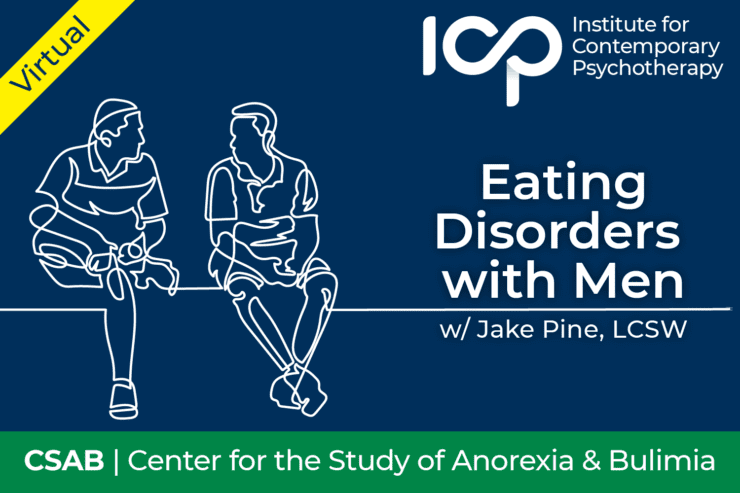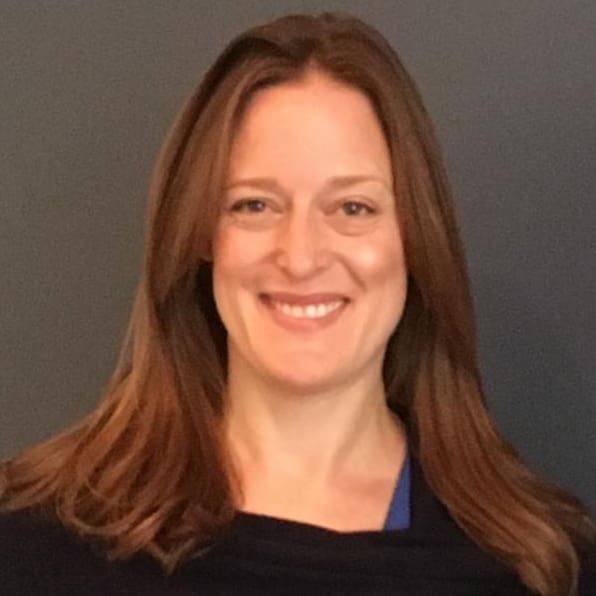
This event will be approved for NYS CE credits
To be notified when registration is posted, sign up for our mailing list by clicking here
An important note about CEs:
ICP is an approved provider of continuing education credits for social workers, mental health counselors, marriage and family therapists, psychologists and psychoanalysts through the New York Department of Education. If your license is from a different state, please contact your state’s licensing board to find out if they will accept CE credits for New York State. If your license is from another state, please enter your license number with your state in parenthesis, ie 54321 (CA).
__________________________________________________

Approved for 2 NYS CE credits
Eating disorder symptoms are understood to be metaphors that when deciphered, can shed light on the etiology and function of the symptoms. Trauma and neglect are part of that etiology. The symptoms express what is unknown, and/or unbearable for the individual to experience or to remember. Group topics include: “Mother=Food,” The Dinner Table,” “Health,” “Too much and Too Little.” The structure provides room to expand the patient’s thinking about what fuels the eating disorder thus providing opportunity for healthy responses. This workshop describes a series of groups devised in a Day Treatment setting for patients with eating disorders, adaptable to an outpatient group.
An important note about CEs:
ICP is an approved provider of continuing education credits for social workers, mental health counselors, marriage and family therapists, psychologists and psychoanalysts through the New York Department of Education. If your license is from a different state, please contact your state’s licensing board to find out if they will accept CE credits for New York State. If your license is from another state, please enter your license number with your state in parenthesis, ie 54321 (CA).
__________________________________________________
Oops! We could not locate your form.


Approved for 6 NYS CE credits
Traverse the five stages of CBT-E, from assessment and case conceptualization to relapse prevention. Engage in dynamic activities such as case studies, role-playing, and group discussions, reinforcing core CBT principles and practical application. We will learn cognitive behavioral techniques as we work through the stages, honing your ability to support and enhance client engagement. These will include navigating exposure methodologies to confront dietary fears, as well as coping strategies to address anxiety and challenges. As we delve into ethical considerations and therapeutic boundaries, you’ll be well-prepared to navigate real-world scenarios ethically and effectively. Walk away with a comprehensive toolkit, ready to guide individuals towards sustainable recovery.
An important note about CEs:
ICP is an approved provider of continuing education credits for social workers, mental health counselors, marriage and family therapists, psychologists and psychoanalysts through the New York Department of Education. If your license is from a different state, please contact your state’s licensing board to find out if they will accept CE credits for New York State. If your license is from another state, please enter your license number with your state in parenthesis, ie 54321 (CA).
__________________________________________________


Approved for 2 NYS CE credits
Patients who come to us with eating disorders initially want change and they are distressed. Most of the time, however, the powerful reasons for the development of their eating disorder, will reemerge. This workshop will focus on the specific outcome and process resistances that are common to eating disorders, and will offer therapists specific tools to use with patients at the outset so that the agenda for the work is established. Ways to positively reframe and maintain the advantages of symptoms will be identified. Additionally we will focus on ways to preserve safety and to offer the Gentle Ultimatum in order to effectively set up a treatment plan that takes pressure off of the therapist needing the patient to change.
About the presenter:
Donna Fish LCSW-R, is a licensed clinical social worker and currently runs a private practice in Manhattan. Current faculty positions include the Center for the Study of Anorexia and Bulimia, and adjunct at Ramapo College where she teaches the clinical course for 2nd year MSW students. Ms. Fish’s prior guest lecture and adjunct positions include Harvard Medical School Dept. of Continuing Ed., and Columbia University. Following the publication of her book “Take the Fight out of Food: How to Prevent and Solve Your Child’s Eating Problems”, Ms. Fish has been a consultant to NYC’s Administration of Child Services, Head Start, Bellevue and Mount Sinai Hospital, the Minnesota School Board, and Renfrew Center.
An important note about CEs:
ICP is an approved provider of continuing education credits for social workers, mental health counselors, marriage and family therapists, psychologists and psychoanalysts through the New York Department of Education. If your license is from a different state, please contact your state’s licensing board to find out if they will accept CE credits for New York State. If your license is from another state, please enter your license number with your state in parenthesis, ie 54321 (CA).
__________________________________________________


Approved for 2 NYS CE credits
In this workshop, a modern understanding of the role psychoanalysis might play in the mental health field will be explored. The hope will be to lead attendants to a practical sense of when and how this might be the intervention of choice for folks seeking therapeutic aid. Transference and Countertransference are the core dynamics of analytic engagement and form the nexus within which deeper healing and wholeness can be sought and found. Please join us in this playful and meaningful engagement!
About the Presenter:
Brian Lathrop is a Psychoanalyst with 33 years of experience living and working in Greenwich Village New York, Brian is a graduate of the Westchester Institute for Psychoanalysis and also a graduate of the Masterson Institute. He has led numerous workshops and trainings on Psychoanalytic technique and approach as it relates to sexual behaviors and the sense of sexual selfhood. He is a specialist in Character Disorders and works primarily within the approach of Dr. James Masterson.
An important note about CEs:
ICP is an approved provider of continuing education credits for social workers, mental health counselors, marriage and family therapists, psychologists and psychoanalysts through the New York Department of Education. If your license is from a different state, please contact your state’s licensing board to find out if they will accept CE credits for New York State. If your license is from another state, please enter your license number with your state in parenthesis, ie 54321 (CA).
__________________________________________________


Approved for 4.5 NYS CE credits
How, where, and when to get treatment for an eating disorder is one of the more difficult and important decisions an individual, family or treatment provider will have to make. This three-session seminar on the treatment of eating disorders will serve as a primer to the different treatment models often used to treat eating disorders. We will also explore the different levels of care frequently utilized in eating disorder treatment, and when and how to decide which level of care is necessary at the different stages of the disorder. This class will introduce participants to concepts of psychodynamic psychotherapy, CBT, DBT, FBT/Maudsley, IFS, and other theories, and their applications to eating disorder treatment. We will become familiar with the nuanced differences between inpatient hospitalization, residential treatment, PHP, IOP, and outpatient treatment.
An important note about CEs:
ICP is an approved provider of continuing education credits for social workers, mental health counselors, marriage and family therapists, psychologists and psychoanalysts through the New York Department of Education. If your license is from a different state, please contact your state’s licensing board to find out if they will accept CE credits for New York State. If your license is from another state, please enter your license number with your state in parenthesis, ie 54321 (CA).
__________________________________________________


20 NYS and AASECT CE Credits
*This is a 10 week-course with two extra dates reserved at the end in case of a class cancellation.
Sexuality and its expression are central to life, yet it’s not uncommon for both client and therapist to collude in avoiding sex-related issues due to mutual discomfort. In an effort to bridge this gap and give clinicians the working tools to integrate sex therapy into their practices, this 10 week workshop will highlight:
In this 10-week workshop, you will learn how to:
Throughout the course, we will be paying close attention to the development and deepening of the therapeutic alliance and the processing of clinical material that happens both in the room and in between sessions through homework assignments. Case studies will be regularly referenced and discussed.
Bio:
Ian Kerner, PhD, LMFT is the co-founder and co-director of the Sex Therapy program at the Institute for Contemporary Psychotherapy. He lectures frequently on topics related to sex and relationships, with recent presentations for the Psychotherapy Networker Symposium, the Ackerman Institute, Tony Robbins, The Society for Sex Therapy and Research and TED 2021. He is a regular contributor to CNN on the topic sexuality and relationships. Ian is the New York Times best-selling author of She Comes First (Harper Collins) which has been translated into more than a dozen languages and the newly released So Tell Me About the Last Time You Had Sex.
__________________________________________________

Workshop: The Elephant not in the Room:
Will Psychoanalysis Survive the Screen?
with Leora Trub, PhD and Joyce Slochower, PhD


Don't miss out on this 2 NYS CE Credit virtual talk on Thursday, September 28th from 7pm-9pm on Zoom with Leora Trub, PhD and Joyce Slochower, PhD
Until Covid upended the psychoanalytic frame as we knew it, most of us assumed that the therapeutic process required that analysts’ and patients’ bodies occupy the same physical space. While Covid forced us to abandon these assumptions, we anticipated, even yearned for the day when we could return to in-person work.
Today we’re in a gray zone. To mask or not to mask? To remain remote or risk exposure? While these decisions in part are informed by clinical considerations, our personal necessities are likely also implicated. Do we rationalize when we declare remote therapy equivalent (or nearly equivalent) to in-person work? Do we minimize the health risk to ourselves and our patients when we return to an in-person model? In this talk we invite you to interrogate the factors—conscious or not—that inform our use (or rejection) of remote work. We also aim to explore the short- and long-term implications of working through a screen for the psychoanalytic field as a whole.
Leora Trub, a clinical psychologist, has written extensively on these issues. She runs the Digital Media and Psychology lab at Pace University where she investigates how technologies affect our conceptions of ourselves and our relationships with others.
Joyce Slochower will act as facilitator and discussant.
Presenter – Leora Trub, PhD
Leora Trub, Ph.D., is Associate Professor at Pace University’s doctoral program in School/Clinical-Child Psychology, and has a private practice in New York City, where she treats adolescents, adults and couples. Her primary research interest is the study of identity development, relationship formation and psychological well-being in the age of technology, and the implications of digital technology on clinical practice. She is the author of numerous papers and chapters on clinical practice in the digital age, and the relationship between technology and psychological constructs including attachment, emotional regulation, intimacy, self-presentation and mindfulness. Her research has been published in a range of research, clinical, and psychoanalytic journals. It has also been reported on in various news outlets, including the New York Times.
Discussant – Joyce Slochower, PhD, ABPP
Joyce Slochower Ph.D., ABPP, is Professor Emerita of Psychology at Hunter College & the Graduate Center, CUNY. Joyce is faculty and supervisor at the NYU Postdoctoral Program, the Steven Mitchell Center, the National Training Program of NIP (all in New York), Philadelphia Center for Relational Studies in Philadelphia and the Psychoanalytic Institute of Northern California in San Francisco. She is on the Editorial Boards of Psychoanalytic Dialogues, Journal of the American Psychoanalytic Association, Ricerca Psicoanalitica and Psychoanalytic Perspectives and is on the Board of the IARPP. Joyce has published over 100 articles on various aspects of psychoanalytic theory and technique. Second Editions of her two books, Holding and Psychoanalysis: A Relational Perspective (1996) and Psychoanalytic Collisions (2006), were released in 2014 by Routledge. She is co-Editor, with Lew Aron and Sue Grand, of “De-idealizing relational theory: a Critique from within” and “Decentering Relational Theory: A Comparative Critique (2018, Routledge). Her forthcoming book, Elephants Under the Couch: Psychoanalysis and the Unspoken, is in press with Karnac. She is in private practice in New York City where she sees individuals and couples, runs supervision and study groups.
For questions about accessibility or to request accommodations please contact Oranda Barnes, Program Manager, at 212-333-3444 ext 107 or at@icpnyc.org.
Refund Policy: Please note that refunds for all AT events are available up until one week before the start of the workshop or module, unless otherwise stated.
__________________________________________________

Workshop: Treatment of Eating Disorders
with Jake Pine
Approved for ?? CE Credits


This three-session introduction to eating disorders seminar will bring attendees into the tricky world of eating disorder diagnosis. We will discuss the differences between disordered eating and eating disorders. We will examine sub-clinical or “off-label” eating disorders and how to spot burgeoning eating disorders in people across the lifespan. In the DSM-V, the delineations between the various eating disorders are clear, but in the real world, the differences are much more nuanced and, often, difficult to ascertain. We will use the DSM as the guide for diagnosis, and using clinical examples and participants’ cases and questions, we will discuss what is, and what isn’t, an eating disorder.
__________________________________________________
Oops! We could not locate your form.